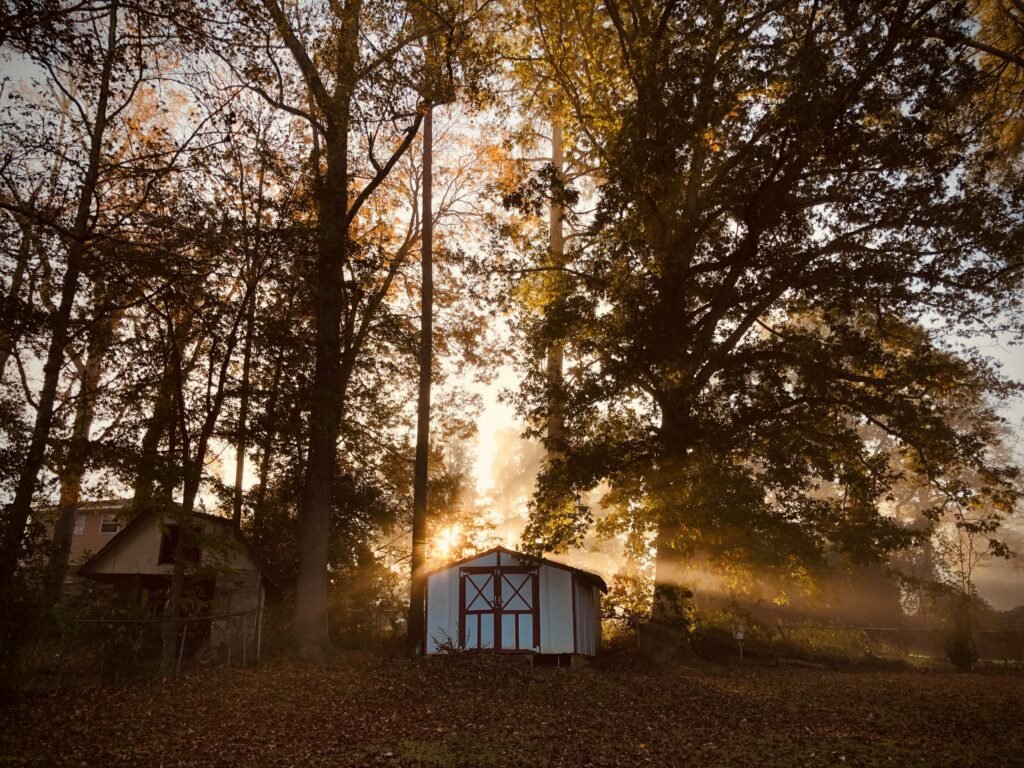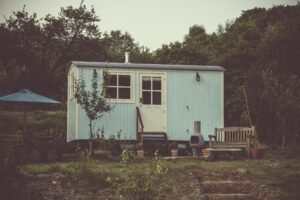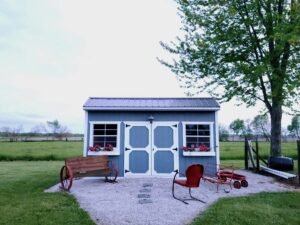Unlocking the Value: How Sheds Can Enhance Property Worth

Introduction
In the world of real estate, every homeowner seeks to maximize the value of their property. From landscaping to interior renovations, the quest to boost home worth is an ongoing pursuit. One often overlooked aspect in this endeavor is the humble shed. While traditionally seen as storage units or workshop spaces, sheds have begun to emerge as potential game-changers in property valuation. This comprehensive guide delves into the intriguing question: "Does a shed increase home worth?" We aim to unravel the relationship between sheds and property value by exploring various factors, from functionality to aesthetics.
Can Sheds Increase Property Value?
Yes, sheds have the potential to increase property value under certain circumstances. Here are some factors to consider:
- Functionality: Sheds that serve a practical purpose, such as providing additional storage space or serving as a workshop, can enhance a property's value. Homebuyers often appreciate the convenience of extra storage or a dedicated workspace, making the property more appealing.
- Aesthetic Appeal: Well-designed sheds that complement the overall architecture and landscaping of the property can add to its visual appeal. Beautifully designed sheds can improve the overall appearance of a house, boosting its visual appeal and raising its market value, attracting more interest from potential buyers.
- Space Optimization: Sheds help optimize outdoor space by providing storage solutions outside the main living areas. This can make the property feel more spacious and organized, positively impacting its perceived value.
- Versatility: Modern sheds are versatile structures that can be adapted for various uses, such as home offices, hobby rooms, or guest accommodations. Their versatility adds to their appeal and can increase the property's overall value.
- Local Market Trends: Property value is influenced by regional market conditions and buyer preferences. In some areas, sheds may be highly sought after and can contribute significantly to property value, while in others, their impact may be less pronounced.
While sheds alone may not drastically increase property value, they can enhance appeal and functionality, contributing to marketability and potentially leading to higher sale prices.
Shed Evolution and Utility

Sheds have evolved remarkably, transitioning from simple storage structures to multifunctional spaces catering to diverse needs. Historically, sheds were primarily practical, serving as storage units for garden tools, lawn equipment, and other outdoor essentials. However, as lifestyles have evolved and homeowners' needs have diversified, so have sheds' roles in residential properties.
In recent years, sheds have transformed into versatile living spaces that offer far more than just storage. The surge in remote work and the gig economy, along with the growing interest in DIY projects and hobbies, has created a higher demand for sheds that can function as home offices, workshops, studios, and personal retreats. As a result, shed manufacturers and designers have responded by developing innovative designs and customizable features to meet these evolving needs.
Modern sheds come in various shapes, sizes, and styles, ranging from traditional wooden structures to sleek, contemporary designs constructed from durable materials like steel, aluminum, or composite materials. These sheds are functional and aesthetically pleasing, with architectural details and finishes that blend seamlessly with the home's landscape and architectural style.
One key factor driving sheds' evolution is their adaptability to different uses and environments. Whether nestled in a backyard garden, positioned alongside a pool deck, or integrated into a rooftop terrace, sheds can be tailored to fit virtually any space and complement any setting. This versatility makes sheds a valuable addition to residential properties, offering homeowners the flexibility to create customized outdoor spaces that enhance their quality of life and reflect their individual preferences and lifestyles.
Moreover, advances in construction techniques and materials have resulted in durable, weather-resistant sheds and energy-efficient and environmentally sustainable sheds. Contemporary sheds are engineered with features like insulated walls and windows, solar panels, and green roofs. These innovations aim to lower energy usage and minimize environmental harm. They're increasingly popular among homeowners who prioritize sustainability, as they offer a way to shrink carbon footprints and cut utility expenses.
In summary, sheds' evolution from simple storage units to versatile living spaces reflects homeowners' changing needs and preferences in today's dynamic housing market. By embracing innovation and the potential of sheds as multifunctional outdoor structures, homeowners can unlock new possibilities for enhancing their properties and improving their quality of life. Whether as a home office, workshop, studio, or retreat, sheds offer endless opportunities for creativity, productivity, and relaxation, making them valuable assets that enrich the residential experience.
Aesthetic Enhancements
 In addition to their functional utility, sheds significantly enhance a property's overall aesthetic appeal. Gone are the days when sheds were merely utilitarian structures relegated to the backyard; today, they are celebrated as architectural features that contribute to visual harmony and charm for outdoor spaces.
In addition to their functional utility, sheds significantly enhance a property's overall aesthetic appeal. Gone are the days when sheds were merely utilitarian structures relegated to the backyard; today, they are celebrated as architectural features that contribute to visual harmony and charm for outdoor spaces.
Contemporary sheds offer a wide range of styles, designs, and materials, giving homeowners the flexibility to select options that enhance their properties' architectural style and landscaping. From classic barn-style sheds with gambrel roofs to sleek, minimalist structures with clean lines and contemporary finishes, the range of aesthetic options is virtually limitless. This diversity ensures that individuals who own homes can discover a shed that fulfills their functional requirements while also adding to the aesthetic charm of their outdoor spaces.
Furthermore, the design of a shed can be tailored to evoke a specific aesthetic theme or mood, whether rustic and cozy, modern and sleek, or eclectic and whimsical. Features like the type of siding used, color combinations, window designs, and decorative accents significantly shape the shed's overall look and feel. These elements empower homeowners to craft outdoor areas that mirror their styles and choices.
Beyond the shed itself, the integration of landscaping elements can further enhance its visual impact and create a cohesive outdoor environment. Encircling the shed with vibrant foliage, blooming flowers, or attractive landscaping elements like walkways, outdoor seating, or stone pathways can effectively integrate the building into its natural surroundings. This enhances the overall appeal of the outdoor space, crafting a serene and welcoming environment perfect for relaxation and enjoyment.
Additionally, sheds have the potential to act as central features or design focal points within outdoor living areas, capturing attention and enhancing the visual appeal of the surroundings. Whether positioned as a standalone feature in the backyard or integrated into a larger outdoor design scheme, a well-designed shed can elevate the entire property's aesthetic appeal, making it more attractive and appealing to homeowners and potential buyers.
In summary, sheds are not just functional structures but also valuable design elements that can enhance a property's overall aesthetic. By selecting sheds that complement their homes' architectural style and landscaping, homeowners can create outdoor spaces that are as beautiful as they are functional. With careful attention to design details and landscaping integration, sheds can become focal points of visual interest that elevate the outdoor living experience, making them invaluable assets that add beauty and value to residential properties.
Storage Solutions and Space Optimization
 Sheds are essential for storage and organization, providing homeowners with valuable space to keep various items such as gardening tools, equipment, seasonal decorations, and outdoor furniture. Shows help homeowners optimize their indoor space and create a more organized and clutter-free environment by providing dedicated storage outside the main living areas.
Sheds are essential for storage and organization, providing homeowners with valuable space to keep various items such as gardening tools, equipment, seasonal decorations, and outdoor furniture. Shows help homeowners optimize their indoor space and create a more organized and clutter-free environment by providing dedicated storage outside the main living areas.
One of the primary advantages of sheds is their ability to free up valuable space within the home by providing an alternative storage solution for items used infrequently or requiring special storage conditions. Bulky gardening equipment, lawnmowers, snow blowers, and other seasonal items can be safely stored in the shed, keeping them out of sight and out of mind until needed.
Moreover, sheds offer a convenient and accessible storage solution for homeowners with limited storage space, such as those living in smaller or older properties with minimal closet space or basement storage. By expanding storage options beyond the confines of the house, sheds help homeowners avoid the need for costly and disruptive home renovations to create additional storage space.
In addition to serving as storage solutions, sheds can be repurposed for various other uses, such as workshops, hobby rooms, or home gyms. These multifunctional spaces offer homeowners the flexibility to pursue their passions and hobbies without infringing on the primary living areas of the home. Whether woodworking, crafting, or exercise, sheds provide dedicated spaces where homeowners can indulge their interests and hobbies in peace and privacy.
Furthermore, sheds can be customized to meet homeowners' specific storage needs and preferences, with options for shelving, hooks, racks, and other organizational features that maximize storage capacity and efficiency. By tailoring the design and layout of the shed to accommodate the items being stored, homeowners can optimize the available space and ensure that everything is easily accessible and well-organized.
In summary, sheds are crucial in providing storage solutions and optimizing space within residential properties. By offering dedicated storage outside the main living areas, sheds help homeowners declutter their homes, create a more organized living environment, and maximize the functionality of their outdoor spaces. With their versatility and customizable features, sheds are invaluable assets that add practicality and convenience to the residential experience, making them essential components of modern living.
Potential Investment Returns
 Investing in a shed is not merely a financial expenditure but a strategic decision that can yield substantial returns in the long run. While the immediate benefits of adding a shed to a property are evident in its enhanced functionality, organization, and aesthetic appeal, the long-term impact on property value is equally significant.
Investing in a shed is not merely a financial expenditure but a strategic decision that can yield substantial returns in the long run. While the immediate benefits of adding a shed to a property are evident in its enhanced functionality, organization, and aesthetic appeal, the long-term impact on property value is equally significant.
Research consistently indicates that real estate properties featuring properly maintained sheds often fetch higher resale prices than those lacking such amenities. This is particularly true in markets where sheds are in high demand and add significant value to the property. Potential buyers often view sheds as valuable amenities that enhance the appeal and desirability of a property, leading them to be willing to pay a premium for homes that include them.
Moreover, sheds offer tangible benefits that resonate with many buyers, such as additional storage space, versatile living areas, and outdoor living and recreation opportunities. These benefits translate into increased marketability and resale potential, making properties with sheds more attractive and competitive in the real estate market.
Furthermore, sheds' versatility ensures their relevance and value over time, as they can be repurposed to meet evolving homeowner needs and preferences. Whether converting a storage shed into a home office, transforming a workshop into a guest cottage, or repurposing a hobby room into a yoga studio, sheds offer endless possibilities for adaptation and customization that add enduring value to the property.
From a financial perspective, the return on investment (ROI) of adding a shed to a property can be significant, particularly when considering the relatively low cost of shed construction or installation compared to the potential increase in property value. While the exact ROI will vary depending on location, market conditions, and the shed's quality, the long-term benefits of investing in a shed far outweigh the initial investment.
For individuals planning to sell their homes down the line, installing a shed is a smart choice as it can increase the property's worth and attractiveness to potential buyers. By recognizing the potential return on investment and leveraging the value-enhancing benefits of sheds, homeowners can make strategic decisions that improve their living experience and maximize the financial value of their properties.
In summary, sheds offer significant potential for investment returns by enhancing property value and marketability. By providing additional storage, living, and recreational space, sheds appeal to a broad range of buyers and contribute to a property's overall desirability.
Investing in a carefully planned and adequately maintained shed offers homeowners immediate advantages and lasting value, boosting the attractiveness and value of their properties amidst the competitive real estate market.
Factors Influencing Property Valuation
While sheds undoubtedly have the potential to enhance property value, several factors influence how potential buyers and appraisers perceive them. Recognizing these elements is crucial for homeowners aiming to improve their property's worth by adding or investing in sheds.
- Location: The property's positioning significantly influences how sheds affect its value assessment. In urban areas with limited outdoor space, sheds that provide additional storage or living space can be highly desirable and contribute significantly to property value. Conversely, in rural or suburban areas where larger lots are more common, the presence of a shed may be less of a determining factor in property valuation.
- Size and Quality of Construction: The size and quality of the shed are essential considerations that influence its impact on property value. Larger sheds with more square footage and higher-quality construction materials are perceived as more valuable and may command higher resale prices. Additionally, well-maintained sheds in good condition are more likely to contribute positively to property value than those that are dilapidated or in need of repair.
- Design and Aesthetics: The shed's design and aesthetics can significantly influence its impact on property valuation. Sheds that complement the property's architectural style and landscaping are more likely to enhance its overall curb appeal and may contribute to a higher perceived value. Conversely, sheds that clash with the property's aesthetic or are poorly designed may detract from its appeal and lower its value.
- Local Market Trends: Property value is influenced by regional market conditions and buyer preferences. In some areas, sheds may be highly sought after and can significantly enhance property value, while in others, their impact may be less pronounced. Understanding local market trends and buyer preferences is essential for homeowners looking to maximize the value of their properties by adding sheds.
- Regulatory Considerations: Homeowners should also be aware of any regulatory considerations that may impact the installation or construction of sheds on their properties. Local zoning laws, building codes, and homeowners' association regulations may impose restrictions on sheds' size, placement, and design, which could affect their impact on property value.
In summary, while sheds have the potential to enhance property value, several factors must be considered to maximize their impact.
By comprehending how factors like geographical location, dimensions, construction quality, architectural design, and prevailing local market tendencies can impact their properties, homeowners can make well-informed choices regarding the installation of sheds. This ensures that sheds enhance the overall value and attractiveness of their properties.
| Factors Influencing Home Worth | Explanation |
| Demand in the Local Market | High demand for sheds in the local real estate market can increase the value of properties with sheds. |
| Shed Quality and Functionality | Well-maintained sheds that offer functional benefits, such as storage space or additional living areas, can contribute to higher property values. |
| Aesthetic Appeal | Sheds that enhance the property's overall aesthetic appeal complementing its architecture and landscaping, may increase home worth. |
| Strategic Integration | Strategic placement and integration of sheds into the property layout can optimize outdoor space and create cohesive living environments, potentially increasing property value. |
| Matching Buyer Preferences | Sheds that align with potential buyers' preferences in size, design, and functionality are more likely to increase a home's worth. |
| Location and Regulations | Properties in areas where sheds are allowed and conform to local regulations may increase value due to the presence of sheds as desirable amenities. |
This table provides an overview of the critical factors determining whether a shed increases a home's worth.
When Does The Property Increase Its Value
Properties with sheds tend to increase in value under several circumstances:
- Demand in the Local Market: If sheds are in high demand in the local real estate market, properties with sheds may command higher prices due to their desirable amenities.
- Well-Maintained and Functional Sheds: Properties with well-maintained sheds that offer functional benefits such as storage space, workshops, or additional living areas are likely to increase in value.
- Enhanced Aesthetic Appeal: Sheds that enhance the property's overall aesthetic appeal, complementing its architectural style and landscaping, can increase its value.
- Strategic Integration: When sheds are strategically integrated into the property layout and design, they can add value by optimizing outdoor space and creating cohesive outdoor living environments.
- Matching Buyer Preferences: Properties with sheds that align with potential buyers' preferences, such as size, design, and functionality, are more likely to attract higher offers and increase in value.
- Location and Local Regulations: In areas where sheds are allowed and conform to local regulations, properties with sheds may see an increase in value, especially if the sheds are considered desirable amenities.
Overall, increased property value associated with sheds depends on various factors, including local market conditions, quality and functionality, aesthetic appeal, and buyer preferences.
Key Takeaways
Here are the key takeaways from the expanded sections:
- Shed Evolution and Utility:
- Sheds have evolved from simple storage structures to multifunctional spaces catering to diverse needs.
- Modern sheds offer versatility and adaptability, serving as home offices, workshops, studios, and retreats.
- Innovation in design and materials allows sheds to complement the architectural style and landscaping of properties.
- Aesthetic Enhancements:
- Sheds contribute significantly to the aesthetic appeal of a property, with diverse styles and designs available.
- Integrating sheds into the landscape enhances visual harmony and creates inviting outdoor spaces.
- Sheds can serve as focal points within outdoor environments, adding interest and charm to the property.
- Storage Solutions and Space Optimization:
- Sheds provide valuable storage space for tools, equipment, and seasonal items, helping homeowners declutter and organize living spaces.
- Repurposing sheds for workshops, hobby rooms, or home gyms maximizes functionality and adds versatility.
- Customizable features optimize storage capacity and efficiency, ensuring easy access to stored items.
- Potential Investment Returns:
- Properties with well-maintained sheds often command higher resale values due to enhanced functionality and market appeal.
- Sheds' versatility ensures their relevance over time, providing long-term value and adaptability to changing homeowner needs.
- Investing in sheds is a wise choice that can increase property value and enhance market appeal.
- Factors Influencing Property Valuation:
- Location, size, quality of construction, design, and local market trends influence the impact of sheds on property value.
- Understanding regulatory considerations and buyer preferences is essential for maximizing the value of sheds.
- Sheds can contribute positively to property value when thoughtfully integrated into the landscape and designed to complement the property's aesthetic and functional needs.
FAQs
- Do sheds increase property value?
- Sheds can increase property value under certain circumstances, such as providing functional benefits, enhancing aesthetic appeal, and aligning with buyer preferences.
- What factors influence the impact of sheds on property value?
- Factors such as shed quality, functionality, aesthetic appeal, strategic integration, local market demand, and regulatory considerations can influence sheds' impact on property value.
- How can I maximize the value of my property with a shed?
- To maximize the value of your property with a shed, consider factors such as shed quality, design, functionality, strategic placement, landscaping integration, and adherence to local regulations.
- Are there any regulations or permits required to build a shed?
- Regulations and permit requirements for building a shed vary by location and may include size, placement, design, and materials restrictions.
- Before starting the construction of a shed, it is crucial to verify the local building regulations and secure any required permits.
- What are some popular shed designs and styles?
- Popular shed designs and styles include traditional barn-style sheds, modern and minimalist sheds, rustic cottages, and custom-designed sheds tailored to specific preferences and needs.
Conclusion
In conclusion, whether a shed increases home worth is not a simple yes or no. Instead, it is a nuanced consideration considering various factors, ranging from functionality and aesthetics to market dynamics and personal preferences. However, when thoughtfully integrated into the landscape, sheds can significantly enhance property value. By recognizing the multifaceted role of sheds and leveraging their strengths, homeowners can unlock hidden value and elevate the appeal of their properties in the competitive real estate market.
- Crafting Affordable Dream Sheds: Cost-Effective Solutions for You
- Affordable Outdoor Storage: Budget-Friendly Shed Alternatives
- Dont Break the Bank: Top Picks for Cheap Shed Options
- Crafting Cost-Effective Solutions: Affordable Shed Construction Explained
- Empowering Your Space: Tips for Managing Shed Construction Budget
- Unveiling Shed Building Cost Estimator: Your Budgets Best Friend
- Revamp Your Shed: Creative Shed Base Ideas for Your Outdoor Oasis
- Elevate Your Shed Game: Unveiling the Magic of Concrete Foundations
- Budget-Friendly Solutions: Exploring Prefab Shed Prices
- Step-by-Step Gravel Shed Foundation Building Made Easy

Leave a Reply
You must be logged in to post a comment.